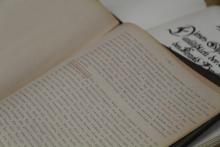
The Arnold Bergstraesser Institute is named after its founder, the social scientist Arnold Bergstraesser (* 14.7.1896 in Darmstadt – † 24.2.1964 in Freiburg). This page provides insights into the life and work of Arnold Bergstraesser by means of a vita, a list of writings, sound recordings and scientific secondary literature.
The Arnold Bergstraesser Institute welcomes additions and comments.
* 14.7.1896 in Darmstadt (Germany) – † 24.2.1964 in Freiburg (Germany)
- He studied economics, sociology and history in Berlin, Tübingen, Munich and Heidelberg
- 1932 he was appointed Eberhard-Gotthein Professor of Political Science and Foreign Affairs at the University of Heidelberg
- 1936 the resumption of his teaching for the summer semester was denied (after a granted free semester)
- 1937 Emigration to the USA , he taught at Claremont College, California and the University of Chicago
- 1950 and 1953, he was visiting professor at the universities of Frankfurt and Erlangen
- 1954 he was appointed to the new chair of political science and sociology at the University of Freiburg
A charismatic teacher of many young academics who would go on to distinguished careers, during his Freiburg years, Bergstraesser became one of the founding fathers of political science in post-war Germany. He was instrumental, often crucially so, in founding and expanding research and educational institutions for the social sciences, among others the German Institute for International and Security Affairs (Stiftung Wissenschaft und Politik), the Akademie für Politische Bildung in Tutzing, the Politische Akademie Eichholz and the Studienhaus Wiesneck in Buchenbach near Freiburg. Through his programmatic writings and many organisational activities Bergstraesser persistently pursued the professional promotion and recognition of political science and sociology in his roles as a founding member and long-serving board member of the Deutsche Vereinigung für Politische Wissenschaft and long-time board member of the German Sociological Association (Deutsche Gesellschaft für Soziologie).
Moreover, from the mid-1950s he played a crucial role in gaining acceptance at the state and federal levels for a social-science-based teaching of civics in high schools and in extracurricular youth and adult education programmes. Mention must also be made of Bergstraesser's active involvement in the advisory councils of the federal government on internal leadership and civics and the Baden-Württemberg Arbeitsgemeinschaft "Bürger im Staat" (forerunner of the Landeszentrale für politische Bildung Baden-Württemberg/Centre for Political Education in Baden-Württemberg).
As an academic, Bergstraesser was particularly committed to transatlantic relations and sociocultural change in the emerging "global society", especially the "developing countries". This interest is reflected in his positions as chairman of the research committee, and from 1955 to 1959 as director of the research institute, of the German Council on Foreign Relations (Deutsche Gesellschaft für Auswärtige Politik), chairman of the Atlantik-Brücke and the German Association for American Studies. From 1960 to 1964 Bergstraesser was a member and president of the German Commission for UNESCO.
In 1960 Bergstraesser created two institutions to research sociocultural change in the major development regions in the, at the time so-called Third World: the Centre for Sociocultural Research, later renamed the Arnold Bergstraesser Institute, and the Research Institute for Global Civilisation. In this respect, he was a visionary, far ahead of his contemporaries in his awareness of the emerging new global society and his demand that his academic discipline respond to the concomitant cultural, social and political challenges.
Arnold Bergstraesser's intellectual and organisational achievements are closely tied up with his conception of political science as a practical science, i.e. one related to practical political action. Bergstraesser's bold postulate that the core of all scientific activity in his discipline is "anticipating political decisions" – in the final analysis political science is about the "things need to be managed" – requires political scientists to reflect normatively on the objectives of politics.

Arnold Bergstraesser's writings reflect his life from the Heidelberg sociology of culture - with France as the primary field of research, the preoccupation with values in classical literature during the emigration years - especially in the work of Goethe, to the commitment to political education and principles of order and values in world politics - in the light of the East-West conflict and (post)colonial North-South relations. Bergstraesser's attention to international cultural research provided a prelude to the themes of the Arnold Bergstraesser Institute.

Arnold Bergstraesser was not only influential through his lectures and publications, but also used the medium of radio in the 1950s to address a broader public. The following list is a chronological compilation of the radio recordings with Arnold Bergstraesser of which we are aware.

Arnold Bergstraesser is considered one of the founding fathers of German political science after the Second World War. Colleagues, students and other authors have dealt with his thinking and works from the various phases of his life in a variety of ways. The following list compiles a selection of important secondary literature.
One of the foundations of this repository is a project financed by the Fritz Thyssen Foundation: "Arnold Bergstraesser: Eine Biographie". Within this project largely untapped sources on the biography and the fields of activity of the social scientist Arnold Bergstraesser have been systematically explored by Prof. Dr. Dieter Oberndörfer and Prof. Dr. Günter Behrmann.
Pictures: Arnold Berstraesser: ABI, Directory of writings: Kira Kurz, Audio recordings: Matt Botsford,Unsplash.com, Secondary Literature: ABI
